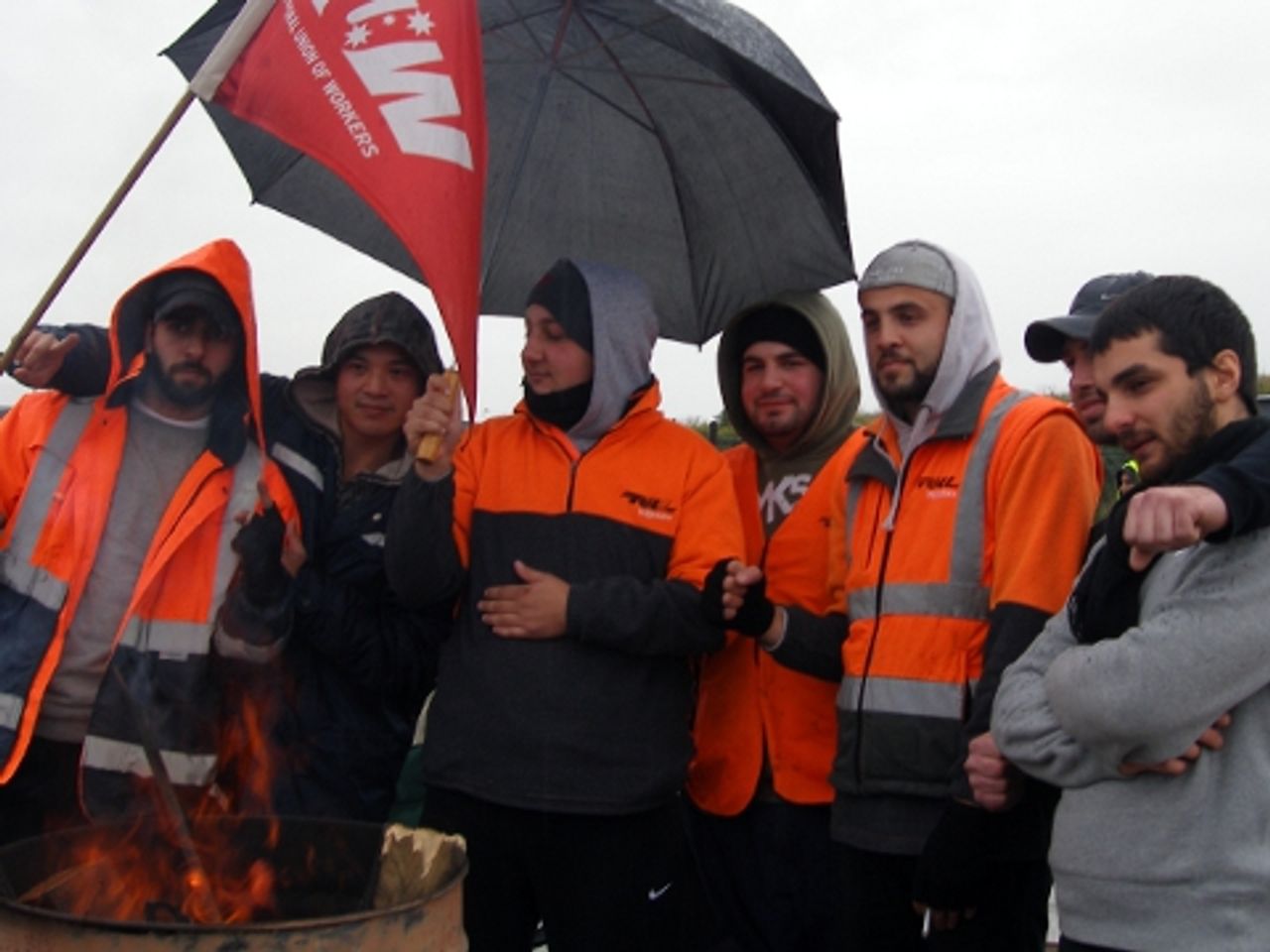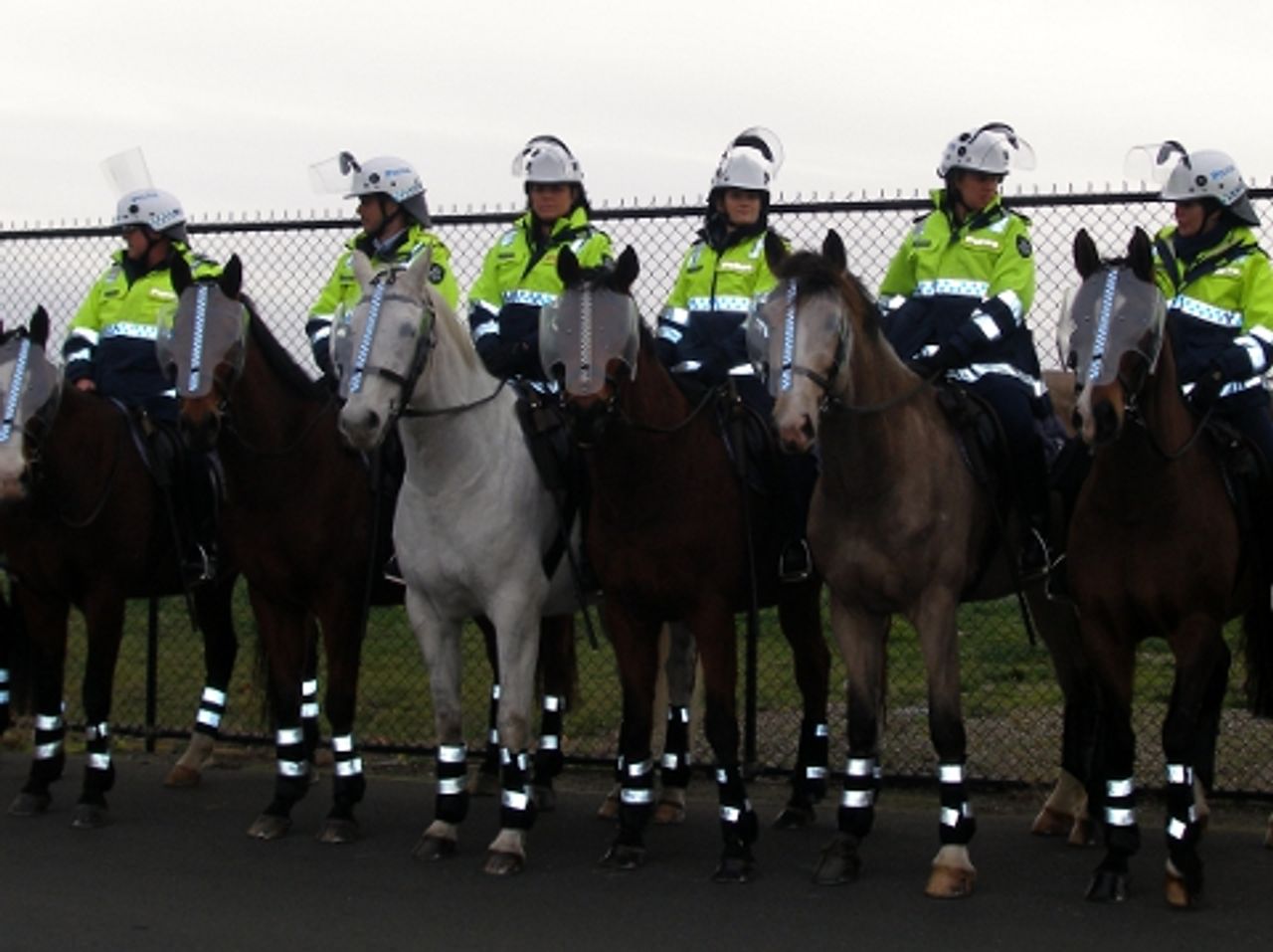A 24-hour picket line, originally established by 600 striking workers at a Toll Holdings-operated national distribution centre for supermarket giant Coles has continued into its second week, despite threats of police violence, and moves by the National Union of Workers (NUW) to strike a deal with the company.
The workers at the Somerton site, in northern Melbourne, are angry at the poor pay and conditions at the site, which are worse than those at other Coles warehouses. Coles outsourced the facility to Toll, a logistics company, in order to slash its costs and boost profit margins. Toll pays workers a base rate of $24.91 per hour, compared to $29 at other Coles warehouses.
Workers originally demanded a 7 percent annual wage rise. The current NUW claim is for a 5 percent rise, shift loadings for afternoon and night shifts, and the introduction of rostered days off for the day shift. It also calls for casuals to be offered permanent positions after several months of employment, a voluntary system for public holidays and protection of union rights.
 Picketing Toll workers
Picketing Toll workersToll has taken legal action against the picket, cynically claiming that its main concern is the well-being of employees who want to return to work. Workers have exposed this lie, reporting that the company has sent them intimidating messages, urging them to defy the “illegal blockade” and break the strike.
On Monday, the Victorian Supreme Court issued an interim injunction barring the NUW, along with 25 union officials and workers named by Toll, from stopping vehicles entering and leaving the warehouse. The union swiftly complied with an order to email workers, and post on its Facebook and twitter accounts, a message that: “Trucks and people must not be prevented from entering or leaving the Toll site.” Yesterday, the Supreme Court extended the injunction until next Wednesday.
On Tuesday, the Australian Financial Review published an editorial, calling for the Victorian state government to mobilise the police to break up the picket line. The editorial warned that the government’s failure “to instruct the police to uphold the rule of law by clearing the way for workers to access their own workplace at a Coles warehouse managed by Toll Holdings has serious implications.”
Yesterday, Victorian Industrial Relations Minister Richard Dalla-Riva echoed the newspaper’s sentiments. In a thinly-veiled threat of police violence, he declared: “Unless common sense prevails, there is an increasing risk that the picket will result in unacceptable injury and cost.”
At the same time, Dalla-Riva appealed to the NUW to broker a settlement, and there are signs that the union is doing everything it can to comply. NUW state secretary Tim Kennedy told the Financial Review that the union had revised and explained its offer during several hours of talks with Toll management. NUW assistant state secretary Gary Mass told the AAP: “What we’re really trying to do is to resolve this dispute.”
The Financial Review’s editorial is a warning that police measures are being prepared against the Coles-Toll workers, with important sections of business viewing the strike as a test case. With announcements of job cuts, attacks on conditions and wages an almost daily occurrence, they are demanding that Premier Ted Baillieu’s government and the police make an example of the Toll workers.
 Mounted police mobilised against pickets last Thursday
Mounted police mobilised against pickets last ThursdayThe Financial Review and other media outlets reported that the police would attempt to break the picket line yesterday morning following Monday’s Supreme Court injunction. The police presence grew at around 11 a.m. and workers reported seeing riot police. Police asked that a busload of managers be allowed to cross the picket line, but workers turned them back.
Management has been intimidating individual strikers, ringing them to urge them to return to work. One worker showed WSWS reporters a mobile phone message sent by Toll management that referred to an “illegal blockade” outside the warehouse.
Workers who have been without pay since the picket began are facing an increasingly dire situation. Asif, who works on the afternoon shift, told the WSWS that he had two children and a wife to support, and only $600 in savings.
Workers have not been paid strike pay. Instead, the NUW has told workers to approach union officials if they experience financial difficulties. This is a recipe to wear down the strikers, and create the conditions for the union to push through a sell-out deal.
The NUW is enforcing the federal Labor government’s anti-strike laws, which have been used to ban all industrial action at other Coles distribution warehouses. Last week, Coles obtained a Fair Work Australia (FWA) tribunal order prohibiting any industrial action at its three New South Wales facilities at Goulburn, Eastern Creek (Sydney) and Somerton.
Workers at the Goulburn warehouse had refused to do extra tasks to cover the Melbourne strikers’ workload, whereupon the management stood them down for four hours. The Labor government’s FWA judges backed the company, declaring any such refusal by workers to be “unlawful industrial action.”
The NUW has made no attempt to link up the struggle of the Coles-Toll workers at Somerton, with the plight of Ford workers in nearby Broadmeadows who were told on Tuesday that the company is axing 440 jobs.
One Somerton striker told the WSWS that workers were extremely dissatisfied with the union three years ago, when it negotiated a previous enterprise agreement that failed to meet their demands. “A lot of people quit the NUW and started looking for another union,” she said, “so now this time, the NUW has responded.”
In other words, the union’s current posturing, claiming to support a militant struggle, is an attempt to recover its credibility, in order to push through yet another betrayal.
The NUW’s duplicity is being assisted by pseudo-left tendencies, such as Socialist Alternative and Socialist Alliance, which have sowed the dangerous illusion among workers that the unions are supporting their struggle.
The unions organised a community rally on Sunday, which was mainly attended by members of the pseudo-left groups. In its coverage of the rally, Socialist Alternative uncritically reported: “ACTU [Australian Council of Trade Unions] president Ged Kearney addressed the rally to pledge support.”
In reality, Kearney’s presence at the rally is a warning that the unions are preparing to sell out the strike. Kearney addressed a similar “community picket” during the Swift dispute early last year, the week before the NUW betrayed that strike. (See: “A reply to the falsifications of the ACTU and pseudo-lefts on the Swift meatworkers’ struggle”)
The ex-radicals are silent on the NUW’s many previous betrayals, including of a six-day strike and picket by Woolworths supermarket warehouse workers at Broadmeadows in late 2010. The union rammed through a settlement that included an effective wage cut for casuals. (See: “Australia: Union rams through sell-out deal for warehouse workers”)
In order to take forward the strike, the Coles-Toll workers need to take the struggle into their own hands. They should form rank-and-file committees, independent of, and against the NUW and ACTU, to coordinate the strike, and make an appeal to other sections of the working class to take a stand, starting with workers at Ford, as well as Coles distribution centres.
The intervention of the police, the courts and the Baillieu government makes it plain that the Toll workers are in a struggle, not just against the company, but the federal Labor and state Liberal governments. To succeed, workers need to break from the unions, establish their own independent rank-and-file committees and turn out to other sections of the working class under attack. Such a struggle must be based on an alternative political perspective: the fight for a workers’ government and socialist policies, including placing the major corporations, such as Coles, Woolworths and Toll, under social ownership and workers’ control.
Subscribe to the IWA-RFC Newsletter
Get email updates on workers’ struggles and a global perspective from the International Workers Alliance of Rank-and-File Committees.
